A rail getaway
Updated: 2012-05-03 09:12
By Sindy Chan (China Daily)
|
||||||||
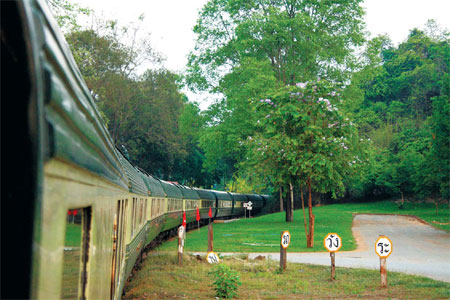
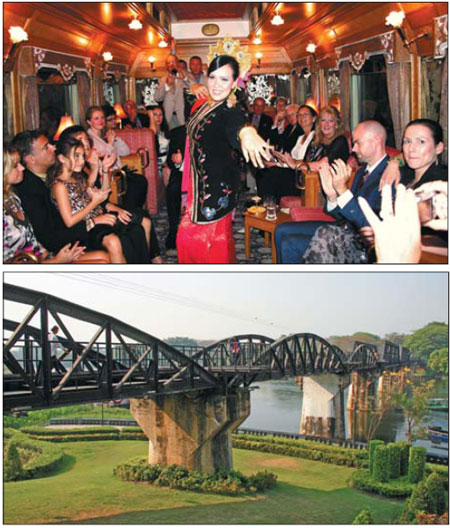 |
|
From top: The E&O Express makes its way on the Thailand-Myanmar Railway. Passengers enjoy a Malay dance performance in the train's piano bar. The train stops at the River Kwai Bridge station for an excursion. Nam Nai Choi / for China Daily |
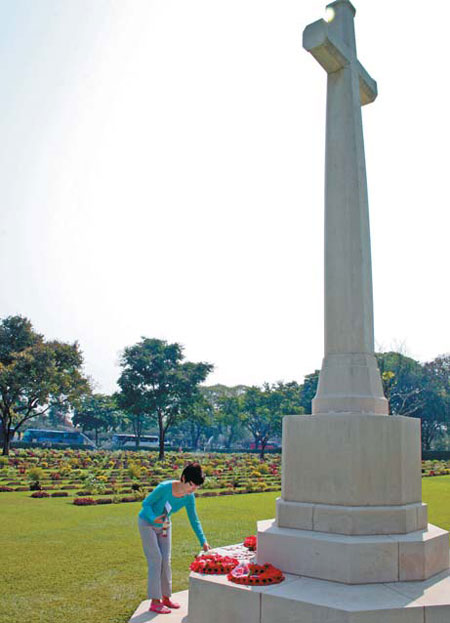 |
|
The Don Rak War Cemetery pays tribute to lives that were sacrificed to build the railway. |
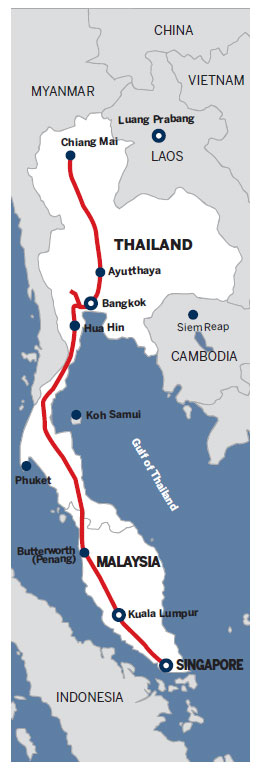
A ride on the Eastern & Oriental Express is not only luxurious, but also an emotional and enriching journey. Sindy Chan reports.
I open my eyes on hearing the faint knock on my cabin door by our steward Fanum. As I look towards the window, bright sun rays shine through rows of cassava trees. What a welcoming sight!
We have arrived at Wang Po, which is situated along the Thailand-Myanmar (formerly known as Burma) Railway, also called the Death Railway.
This is one section where I was told earlier that I should step out of my cabin for a better view. I rush to the open-air observation car together with other passengers in the Eastern &Oriental (E&O) Express as the train makes its way through the tortuously winding Tham Kasae viaduct, where the cliffs are barely an arm's length away.
The viaduct is a 300-meter long wooden trestle bridge clinging to the limestone cliff, which faces the River Kwai Noi.
As we approach the end of the bridge, the train quickly passes a gloomy cave illuminated with flickering candles.
It is morning and the second day of our 2,000-km, four-day luxurious railway journey, which covers Thailand, Malaysia and Singapore.
We pulled up at the infamous River Kwai Bridge station, a terminal which invoked various emotions among the train passengers. The historical site is where Asian forced laborers and Allied Forces prisoners of war constructed the original River Kwai Bridge.
But my heart was won over by the inconspicuous existence of the "huajun bei" by the bridge pier. It is a stone monument in remembrance of the Chinese Army that was sent here to join the Allied Forces during World War II.
The undercurrent of emotions was even stronger inside the Thailand-Myanmar Railway Center where visitors read the facts and figures of the construction of the 415-km Death Railway. It was completed in 12 months at the cost of 130,000 lives.
Across the street, we paid a special visit to the Don Rak War Cemetery, where visitors were seen placing flowers on the gravestones as a sign of respect to the sailors, soldiers and airmen who sacrificed their lives building the railway.
We head towards Malaysia, after a day-and-a-half of intense traveling to historical sites. The rest of the day on board is free and easy. Some spend time reading while others are seen chatting with the train manager or fellow passengers.
I find a spot at the open-deck of the observation car taking in the sights of the countryside as the train winds through mountains, jungles and paddy fields en route to Butterworth, a town in northern Malaysia.
Afternoon tea is served in the train compartment by Fanum. He is Thai and like most Thais, he is very service-oriented and polite. I complement him and tell him how pleased I am with the food and service of the E&O Express since we boarded the train at Hualongpong Station in Thailand two evenings ago.
Our train arrives at Butterworth, two hours later than scheduled. From Butterworth, we cross a 13.5-km long bridge for an excursion to George Town on Penang Island, a city which was declared a UNESCO World Heritage Site in 2008. Founded in 1786 by Captain Francis Light, a trader for the British East India Company, George Town is the capital of Penang state.
We start our quick tour of the city on trishaw at Khoo Kongsi, one of the grandest Chinese temples in Penang and Malaysia. Our tour guide Kevin is a Malaysia-born Chinese, who gives us a witty pre-tour briefing about trishaw drivers in George Town.
"We call them 'King of the Roads'. They drive in the reverse direction and are color blind to traffic lights. If you hit them on the road, it's your fault. If they hit you, they have no money to pay you."
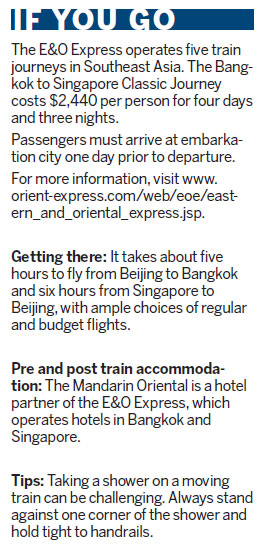
Our experience? Trishaw drivers in George Town are really efficient. They navigate very well and at the same time, they could still point to us photography angles and tell stories of rich men and their mistresses who live on "Love Lane".
Dinner on board that evening is quite special. While enjoying the sumptuous meal, we are entertained by traditional Malay dances. Some passengers even join the dancers on stage.
I return to my compartment, as the train passes by palm and coconut trees silhouette against the moonlight sky. The fragrance of tropical flowers in the wilderness fills the air.
We encounter another delay after Butterworth. Derailment of a cargo train has caused all southbound trains to queue up on the tracks. As a result, our train journey has to end at Kluang Malaysia instead of Woodlands Singapore.
Despite the delay, no one complains as the contingency arrangements are efficient. The food, itinerary and service throughout the journey have been great. To compensate us for the delay, there is an extra lunch with complimentary red and white wine.
In fact, the delay becomes a blessing in disguise. We were given a tour of Kluang, a town in southern Malaysia, which produces some of Malaysia's best coffee.
From Kluang, we travel by coach to the south all the way to Singapore. We are exhausted by the time we arrive in Singapore and decide to indulge ourselves with a soothing Teh Hijau (Green Tea) spa in our hotel, which overlooks Marina Bay, Singapore Flyer, Marina Bay Sands and Formula One race tracks.
The four-day voyage is just too short. Taking the E&O Express is not just a luxurious travel option. To me it is one of the best ways of appreciating Southeast Asia.

 'Taken 2' grabs movie box office crown
'Taken 2' grabs movie box office crown
 Rihanna's 'Diamonds' tops UK pop chart
Rihanna's 'Diamonds' tops UK pop chart
 Fans get look at vintage Rolling Stones
Fans get look at vintage Rolling Stones
 Celebrities attend Power of Women event
Celebrities attend Power of Women event
 Ang Lee breaks 'every rule' to make unlikely new Life of Pi film
Ang Lee breaks 'every rule' to make unlikely new Life of Pi film
 Rihanna almost thrown out of nightclub
Rihanna almost thrown out of nightclub
 'Dark Knight' wins weekend box office
'Dark Knight' wins weekend box office
 'Total Recall' stars gather in Beverly Hills
'Total Recall' stars gather in Beverly Hills
Most Viewed
Editor's Picks

|

|

|

|

|

|
Today's Top News
Health new priority for quake zone
Xi meets US top military officer
Japan's boats driven out of Diaoyu
China mulls online shopping legislation
Bird flu death toll rises to 22
Putin appoints new ambassador to China
Japanese ships blocked from Diaoyu Islands
Inspired by Guan, more Chinese pick up golf
US Weekly

|

|







